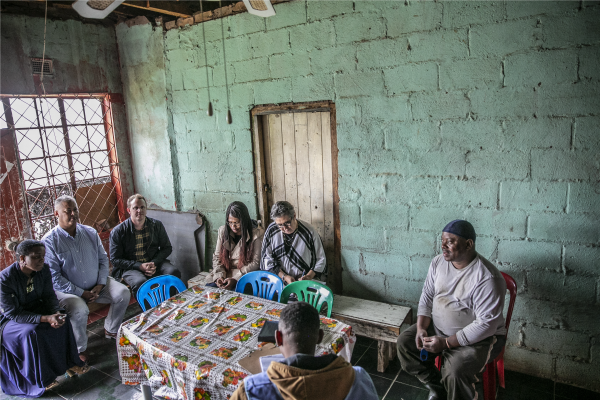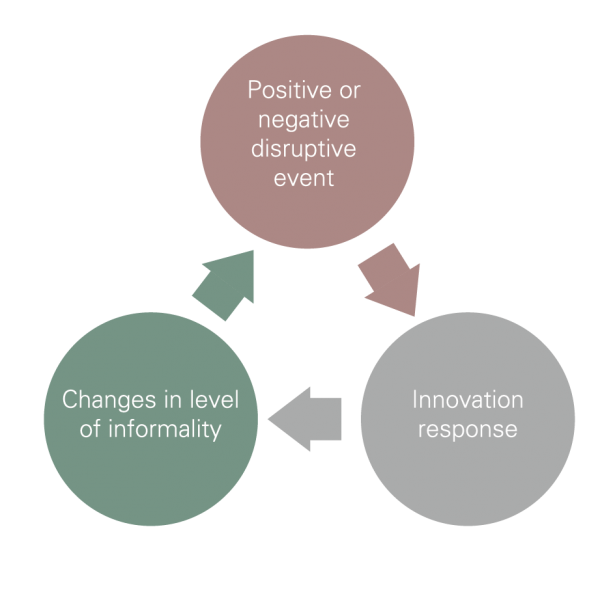Informal businesses catalyse innovation in Mpumuza, Sweetwaters

Researchers conducting an informal innovation survey meet Mr Gwala at his business premises in Mpumuza, Sweetwaters, in KwaZulu-Natal to learn more about the challenges and opportunities of the local business environment. Photo: HSRC
Conventional thinking sees formal and informal businesses as binary opposites. But a recent study by the HSRC’s Centre for Science, Technology and Innovation Indicators reveals that informal traders engage in dynamic processes to catalyse innovation and contribute to the growth of their micro- and small-scale enterprises. By Nazeem Mustapha and Nicole van Rheede
Innovation is typically associated with high-tech multinational corporations at the forefront of technology, algorithms, and artificial intelligence, but a growing body of literature shows that innovation can take different forms in a variety of contexts. We found the definition of ‘innovation’ provided in the latest version of the Organisation for Economic Cooperation and Development’s Oslo Manual to be suitably comprehensive to not only research, but also measure innovation in the informal business sector:
…innovation is a new or improved product or process (or a combination thereof) that differs significantly from the unit’s previous products or processes and that has been made available to potential users (product) or brought into use by the unit (process). (OECD, 2018, p.32)
Businesses in the informal sector are by necessity very innovative. For that reason, innovation may even be considered a characteristic of informal businesses. In general, innovation in the informal sector is non-technological and takes place at the level of the individual or household. The main innovation activity that informal enterprises undertake involves using new equipment and tools to develop capability.
Much innovation activity also lies in imitating and even copying the products and services of formal and informal competitors. The types of economic activity engaged in may rapidly change within a single informal enterprise, as it adapts to changes in customer demand. Such agility is necessary for informal-sector enterprises to survive, given the socioeconomic context in which they operate, characterised by low household incomes and limited support. Despite this, the spirit of the informal business owner represents a willingness to adapt to changing circumstances and grasp new opportunities.
In 2017 and 2018, our team conducted a baseline survey to measure innovation in the informal sector. Based on an analysis of the full study sample of close to 1 000 businesses operating in Sweetwaters (Ward 1, Mpumuza, Msunduzi Municipality, KwaZulu-Natal), we found that most innovation activity occurred in the day-to-day activities of an informal business.
The most prevalent innovation mode was when employees ‘learn by using’ (83.6%), followed by doing everyday work tasks (57.6%) and imitating the products of formal businesses (44.4%). Businesses notably added new products quickly to their existing offerings, based on anticipated customer needs or as a result of customer requests – a common practice in food retail or food service informal businesses.
Using the survey results to understand the informal food sector, our team conducted a digital storytelling workshop and case-study interviews to explore the dynamics of innovation in the informal food sector in more depth.
Degrees of informality
There is a rich range of informality in Mpumuza’s informal food sector, with the level of informality depending on many factors such as firm size, registration status, the keeping of financial records, business premises and access to finance. A formal, sustainable microenterprise is characterised by its strengths with regard to each of these factors. The process of innovation supports the business evolution required to build and strengthen local food-sector value chains serving low-income and impoverished households.
The dynamics of the informal sector are such that conceptualising informality as the binary opposite of the formal sector belies the diversity of shape, size and resilience strategies to be found in the informal sector. Rather, formality is better conceptualised as a process encompassing varying degrees. It is also not progressive or linear, as businesses can fall and rise with varying degrees of formality multiple times in their business lifecycle. Based on this, we need to understand the pathways through which informal businesses evolve and become sustainable in order to inform policies with the aim of supporting transformative and inclusive change in this important sector.
Our study mapped the degrees of formality of 271 food businesses in accordance with a framework described by Ahmadou Aly Mbaye and Fatou Gueye in Formal and Informal Enterprises in Francophone Africa: Moving Toward a Vibrant Private Sector (2020), which includes criteria like enterprise size, registration status, maintenance of financial statements, access to business premises, and access to finance.
Criteria are cumulative and their fulfilment gives rise to different levels of informality. When no criteria are fulfilled, the business is considered totally informal. When one criterion is fulfilled, the business increases in formality and moves to a higher level. Criterion 1 is fulfilled if the business employs more than five people, thereby attaining a higher degree of formality. Registration with a tax authority or the department responsible for trade and industry or any other official registration results in criterion 2 being fulfilled. If the business maintains regular, accurate accounts and financial statements, then criterion 3 is met and a higher degree of formality is achieved. If the business has premises it operates from and has received any external finance in the previous five years, the last two criteria will be met, resulting in a lower degree of business informality.
Reframing formality as a process rather than a state means that the interaction between the business and other actors can be considered as enhancing informal-business capabilities.
Innovation within degrees of formality
The study enabled us to explore whether innovation contributes to changes in formality. What we found was that a change of formality was attributed to innovation and that this often occurred in response to a disruptive event that the business owner experienced. Disruptive events ranged from financial difficulties to illness or crime, where the owner’s response brought about a change in the business to ensure its survival.
Innovation by the owner in response to a crisis aligns closely with the degrees of formality and informality depicted by Mbaye and Gueye (2020), such that owners may move premises for more security as a result of crime, close a bank account to reduce costs or implement new systems to manage finances when faced with financial difficulty. We found that these innovative ‘adaptive’ capabilities of informal businesses meant that disruptive events could result in lower or higher degrees of informality and have a transformative impact. The box below contains a vignette from our case study contextualising this relationship (a pseudonym is used).
Mandla’s flowers and vegetables
A key asset of Mandla’s business was a vehicle, which was lost after the owner was involved in an accident. The vehicle had been used to transport produce from the owner’s dwelling to various customers.
After the accident, the vehicle was scrapped, leaving the owner stranded, and preventing the business from carrying out deliveries and providing transport. This event compelled the owner to diversify the business beyond the delivery of flowers and vegetables, and to seek out alternative opportunities for the sale of products.
This process resulted in new sales at a weekend flea market in addition to undertaking deliveries when the owner was eventually able to purchase another vehicle. The outcome was business growth and new market opportunities.
Understanding informality for better policy development
Innovation is characteristic of informal enterprises and takes many different shapes in the informal sector. It is frequently triggered by disruptive events that help businesses to survive, stabilise and grow. By shifting the focus from business formalisation to innovation, policy could more realistically improve the development of businesses in the informal sector. If the goal is to have informal businesses formally registered, then understanding formality as a process reveals multiple leverage points for policy intervention to not only facilitate business registration, but also to also help businesses become sustainable and equip owners with knowledge, networks and tools for growth.
Our study looked at informal business as the access point to understand its location and interactions within a local innovation and production system. Future research will seek to understand how the innovator or informal-business owner promotes their own location and interactions within that system.
Authors: Dr Nazeem Mustapha, a chief research specialist, and Nicole van Rheede, a PhD candidate, at the HSRC’s Centre for Science, Technology and Innovation Indicators

